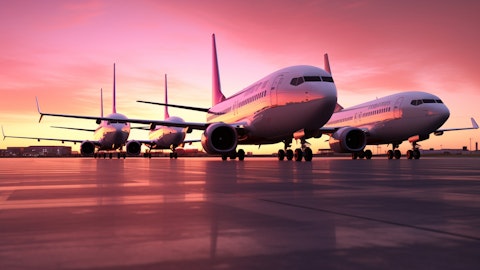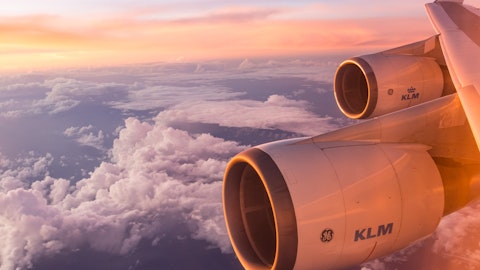Eddie Wilson: Yes. I mean it’s – if you look at the UK, it’s primarily really a licensing issue as Michael says, a particular tightness in that market that you don’t have the fluidity of moving pilots around from different parts of Europe that you had pre-Brexit. But what we’ve done over the last number of years because we don’t take people from other airlines, we’ve been growing sort of our input of Cadet into the UK system. So that, coupled with the pay issues that we have dealt with there, that should sort that out. This isn’t just – it’s not – it’s the same for engineers as well because it is primarily driven by Brexit until the supply issues are sorted.
Michael O’Leary: Okay, thanks, Eddy. Thanks, Sathish. Next question please.
Operator: The next question will come from Alex Irving from Bernstein. Please go ahead Alex, your line is open.
Michael O’Leary: Alex, hi.
Alex Irving: Hi, good morning, gentlemen. Two for me, please. First, on the OTAs. Can you please tell me what’s your typical level of ancillary spend per passenger is on an OTA booking versus direct booking. Is there a revenue opportunity here from the new deals or a greater share of pirate bookings? Also, is there any cost saving opportunities from the OTA change with the reduction in the level of manual post-sales servicing. Second question is on unit cost. It will be maintenance. You saw maintenance costs up 40% this capacity up 89% year-on-year. What’s driving that please? And are there any one-offs we should be aware of? Thanks.
Michael O’Leary: Okay. I’m going to have Tracy Malloy here. We’re going to get hard that maintenance cost question, Neil. And then just so on the OTA, look, I don’t think there’s any particular upside on ancillaries. There’s a lot of kind of misguided coverage here we want to take these bookings direct so we can maximize our ancillaries. The big issue with the OTAs is one, we don’t want anybody illegally scraping our website. That is digital piracy. It’s our data, and we are a bit like music piracy or film piracy, it should be outlook. We wouldn’t have such a big issue with it if they weren’t scamming customers. And so we have, for a number of years, been chasing down some of these pirate to some overtime.
And what they don’t do is they don’t – we get less of an issue with them if they suddenly said to each customer, we are the OTA and here is an OTA fee of €5 per the OTA. I think then the customer could decide whether they want to make the bookings to that OTA and pay the fiber or come directly to Ryanair instead. They’ve been scamming and inflating our airfares. They’re scamming and inflating the ancillaries. I think there might be a slightly better conversion of ancillaries if we are able to communicate directly with the passenger or the bookings made directly in the website. And in some cases, we released this on a monthly basis, our OTA pirate service. Some of these OTAs are inflating our ancillaries, the bag charges, the sea charged by 300% and 400%, so I think there might be a slightly better conversion of ancillaries if every customer has access to our ancillaries at the published prices on our website.
But there’s no big jump in ancillaries as a result of getting rid of the OTAs. I think there may be – what we’re trying to do is to protect consumers from being overcharged by these intermediaries and over the longer-term, we don’t want a booking.com or some other third party to be able to insert themselves between us and our customer, capture a huge amount of customers as they have done, for example, in hotel distribution, I then turn around to us and reimpose on us what we had 30 years ago when we had to pay 20% for distribution through travel agents and global GDS. We do not want – we cannot afford to pay kind of extravagant commissions for distribution, particularly where there’s no cost of distribution through the Internet because that would simply inflate the airfares, which would be not in the consumer interest.
So we will continue to battle intermediaries, particularly those who are engaged in digital piracy who want to insert themselves between us and our consumer, overcharge the consumer are at some point in time in the future turnaround and try and overcharge us in a manner that would inflate the cost of air charge for consumers. But I don’t foresee, Alex, if there’s any immediate upside in ancillaries, although probably a little bit of a jump in conversion by not overcharging consumers for ancillaries. Tracy, maintenance costs.
Unidentified Company Representative: For maintenance costs, we the timing of the check. So we brought forward more checks following Q4 into Q3. So we don’t see that we see a drop in Q4. We also have late growing increases in our perfect maintenance facilities, driving the club coming out from A320 and [indiscernible]. And again, we brought forward some of the maintenance of the A320, just in anticipation that the MRO shops may fold with the GTF issues that face in the next few months.
Michael O’Leary: Thanks, Tracy. Well done. Next question please.
Operator: The next question comes from James Hollins from BNP Paribas. Please go ahead, James.
Michael O’Leary: James, hi.
James Hollins: Thanks. Two for me on the OTAs. The first one is, would you expect to do deals with all the OTAs or be some off limits like Booking.com given your history of toss them and are they coming to you for deals? And secondly, you – thank you for quantifying 10% to 15% tickets historically sold through OTA pirates, your words don’t mind. I was wondering how that normalizes so quickly, and that’s higher than I thought it would be, and you seem to be implying that this is kind of a December, January issue rather than anything longer than that enlightening as to what that would be. Thanks.



